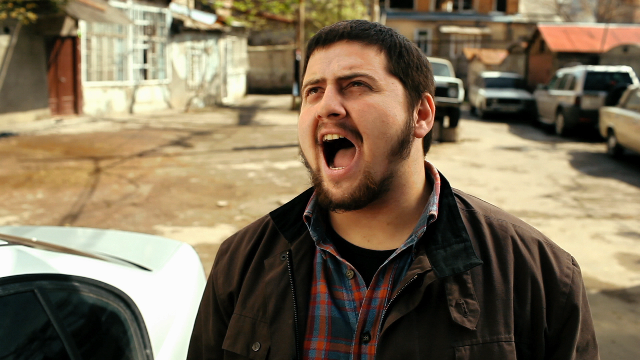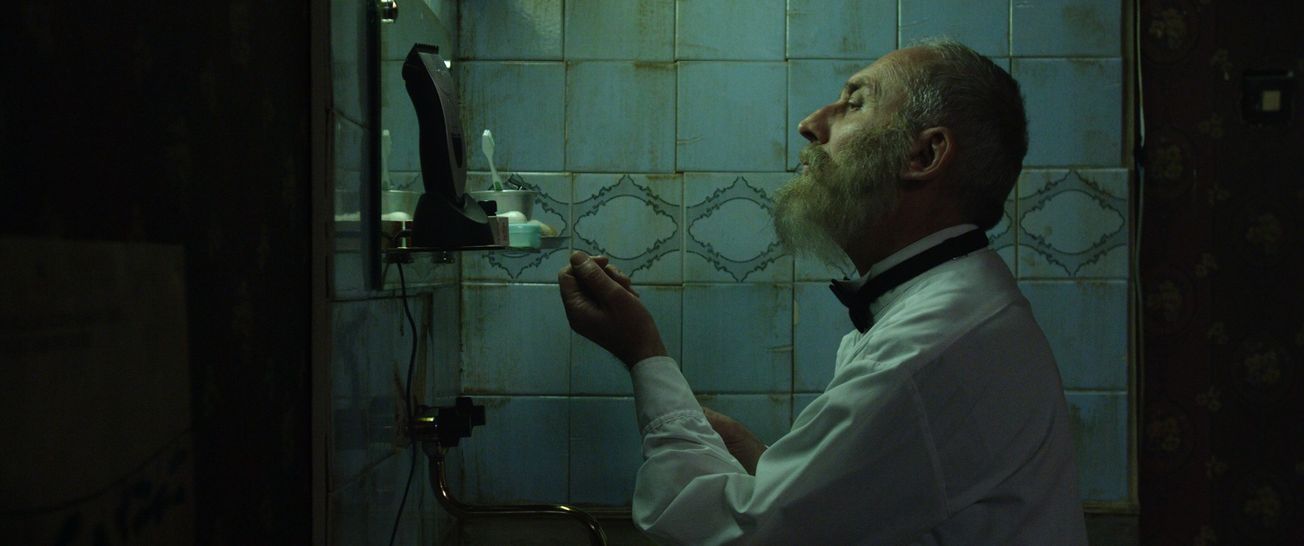by James Turnbull, Film & TV Online Editor
Georgian cinema was a big deal in the 1960s, but faded over the next 50 years. In the last decade, new filmmakers from the country have emerged and their work was shown by Encounters Film Festival.
Georgian cinema, after flying well under the radar for a while, is enjoying a renaissance of sorts. A number of its most promising film-makers have received plaudits and competed for major awards at European film festivals, including the Cannes Film Festival’s Palme D’Or for Short Film. The Encounters Film Festival hoped to turn a few more avid cinephiles’ eyes eastwards with this selection of seven highly regarded shorts from Georgia shown at Watershed during Freshers’ Week.
The screening began on a light-hearted note with Waiting for Mum (dir. Nana Ekvtimishvili), a film as self-explanatory as a tin of Ronseal. A man leaves his bustling apartment block, walks to his car and finds he’s left his car keys at home, which means he has no choice but to shout for his mother, who is still inside. Each noticeable frustrating yell of ‘Mother!’ draws some unwanted attention from residents, and the familial bickering between the protagonist and his neighbours gives the setting intimacy.

Tbilisi Film Festival / Waiting for Mum (dir. Nana Ekvtimishvili)
When the protagonist finally gets his mother’s attention, the ensuing scavenger hunt for his keys takes place entirely offscreen, but viewers are put in the main character’s shoes through the clever use of non-diegetic sound, as we wonder what on earth the mother is actually doing as she searches high and low for the car keys. All in all, it is an endearing tale that left a big smile on my face – one that was immediately wiped off it by the film that came next.
Dinola (2013 dir. Mariam Khatchvani) opens in stark fashion in a tiny village nestled in the endless snows of a Georgian mountainside. It’s a community frozen in time and one where a family mourns the recent death of its patriarch. A boy and a girl, the titular Dinola, look out into the icy void around them, and one innocently asks the other, ‘Has your mother disappeared?’
The response - ‘when my father went asleep, my mother disappeared’ - sounds like the euphemistic descriptions of death and mourning that children often turn to, at least to the average Western viewer. But as the film progresses, the chilling context of these comments is revealed. An old tradition in the Svaneti region of Georgia meant a widowed woman could be claimed by any man who wanted her as his new wife, and then separated from her family without any questions asked.
Vimeo / Good Short Films / Dinola (dir. Mariam Khatchvani)
Dinola uses the assumptions of viewers who are not familiar with the tragedies of this region to make its conclusion all the more powerful, and the original discussion between two confused children all the more heartbreaking. The fact that so many people have had their eyes opened to this previously unknown pain speaks to the enduring power of short films, as well as the value of experiencing the stories of regions other than your own.
Up next was Invisible Spaces (dir. Dea Kulumbegashvili), a captivating portrayal of a devout family burdened by tension and hidden pain. The lifeless surroundings of the apartment and muted colour palette combine to trap a nervous mother and her child with a husband whose true character lurks behind a well-maintained facade of fatherly affection. The way the film portrays abuse and the way it slowly poisons a family is masterful; you can certainly see why Invisible Spaces was so well-received at Cannes.
A loose theme of fatherhood links Invisible Spaces with the film that followed: Mama (dir. Data Phirtskalava) which, rather confusingly, means ‘father’ in Georgian. In it, two young men are visited by their long-estranged father, and the awkward meeting that ensues speaks volumes to the distance between them. His gift of phosphorous stars – glow-in-the-dark decorations you might put on a young child’s ceiling – says it all. One of the sons can only express his anger over his father’s previous abandonment in the mirror, as his true feelings fail to materialise when he has the chance.
Youtube / Busan International Short Film Festival
Later, the sons embark on what appears to be a regular nightly activity and break into a car to steal a radio – but not without being discovered by the car’s owner and chased across town. The film began to lose me here, though I appreciate the fact that the theme of connection between father and son is worked into the chase scene.
A black-and-white double bill came next: Lethe (dir: Dea Kulumbegashvili) and Chasing the Wind (dir: Zura Demetreshvili). Lethe follows the inhabitants of a small village during a riverside celebration, as a young girl navigates the awkward advances of a teenage admirer and an old man on horseback lurking on the periphery. Ultimately, it failed to move me – a feeling that the audience shared, judging my the muted applause it received. Chasing the Wind is a more compelling effort about a man, haunted by demons and trapped in an uncaring world, who wants to make a clean break as he tries to care for a young, deaf girl.
And then there was the final film – and possibly my favourite of them all. In 8 Minutes (dir. Giorgi Gogichaishvili), scientists reveal that the Sun has literally gone out, leaving Earth with a mere eight minutes and 20 seconds of sunlight before permanent darkness engulfs the planet. The streets are a chaotic, bloody mess, and every news channel is simply counting down the seconds.
Youtube / FilmFestival Cottbus
And yet, at the centre of it all, one man sees an opportunity to play a rather elaborate prank on his estranged son, who is away on an expedition with his partner. The twist is the perfect combination of clever and macabre, and the soundtrack gives the final minutes of the film a wonderful energy all the way till the closing credits. I’ll leave the ending as a surprise to those curious enough to seek this gem out.
With that, the Georgian odyssey was over. If Encounters hoped to open our eyes to a new world of cinematic talent and make us rethink certain assumptions about the stories we watch unfold on screen, then I can confidently say: mission accomplished.
Featured Image: Encounters Film Festival / New Georgian Talent / 8 Minutes (dir. Giorgi Gogichaishvili)
Didn't get a chance to see anything at Encounters this year? Check out their website for what you can watch online.
Facebook // Epigram Film & TV // Twitter








